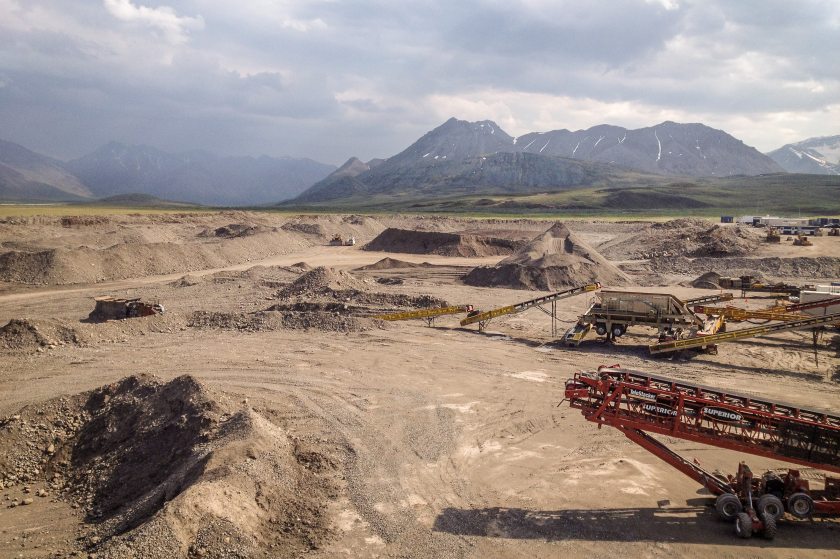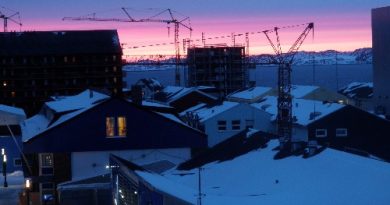U.S. Army Corps of Engineers investigating Arctic wetland ‘gravel stockpiling’

Believing the state of Alaska plans to stockpile gravel to build a controversial road through the Arctic wilderness — a proposed gravel extension off the rugged highway featured in cable TV’s Ice Road Truckers — an alarmed conservation group is calling on the U.S. Army Corps of Engineers to hold a public hearing before more gravel is extracted.
Adding to the concern is that a state contractor had already begun digging up gravel from a 15-acre wetlands area — near a proposed start for the Road to Umiat — though state transportation planners had no Corps wetlands permit for the work.
“We’re pretty concerned about what’s going on here and making sure the public is informed,” said Jill Yordy, head of the clean water and mining program for the Northern Alaska Environmental Center in Fairbanks.
Now, the Alaska Department of Transportation is asking the Corps to retroactively permit the “unauthorized” work, and to approve gravel extraction from an additional 70 acres of wetlands at the site, located near Galbraith Lake some 200 miles southeast of Barrow.
Department of Transportation officials say the stockpile will be used only to improve and maintain miles 274 to 289 of the Dalton Highway, popularly known as the haul road, a critical and aging corridor needed to service the trans-Alaska oil pipeline.
“I can guarantee this won’t be used for an Umiat road,” said DOT spokeswoman Meadow Bailey.
Bailey said the proposed road is a far-off prospect, and extracting gravel for it now makes little sense. In fact, there’s been no decision on where the Road to Umiat would start. It may spur off the Dalton Highway at Galbraith Lake — stretching about 100 miles to Umiat — or it may start at two other points along a 200-mile stretch of the highway, according to an environmental impact statement the Army Corps is currently working on for the state, Bailey said.
“It’s very preliminary, and before any decision can be made on a route, it will all have to be discussed in public meetings,” Bailey said.
The disputed Umiat road is one prong of Gov. Sean Parnell’s “Roads to Resources” plan to increase access to mineral and hydrocarbon deposits lying fallow in underdeveloped areas of Alaska.
Conservation groups fear the road would damage fragile wilderness west of the Dalton Highway and bring bulldozers to the edge of the federally protected National Petroleum Reserve-Alaska, an Indiana-sized area that contains untapped oil and coal deposits. Native villagers living in Anaktuvuk Pass north of the Brooks Range believe a road to Umiat would disrupt caribou migrations and bring competition from weekend sport hunters, changes that could drive away the ungulates and threaten subsistence hunting.
“Now, I’m getting goose bumps all over,” said Esther Hugo, a city councilwoman from the village, after she learned about the conservation group’s concerns.
The village corporation and the two local governing bodies in Anaktuvuk Pass, population 344, have persistently fought the road, she said.
“We really oppose it and I keep telling the governor’s assistants, ‘You’ll hear us repeat over and over, we need the migration of our caribou. We eat with that and we survive with it.'”
Umiat, an oil-and-gas exploration camp, could be critical to Alaska. Its importance was highlighted this winter when Linc Energy built an ice road from the Dalton Highway to launch exploration drilling near Umiat. Estimates say the Colorado-based explorer could be sitting on a billion-barrel oil field. State lawmakers are counting on its development to help pay for a massive tax break they recently provided to oil producers.
A road to Umiat would allow the year-round access that would be needed if oil flows from there, and open the door for more development.
Yordy, with the conservation group, said she’s concerned because the state’s request for permission to use the wetlands — which would modify an existing permit — calls for improvements to the Dalton Highway, as well as “anticipated future needs.”
Bailey said the state has no hidden agenda. The improvements are part of a $28 million project that includes strengthening embankments, widening the highway and adding guardrails, the same improvements being made elsewhere along the Dalton.
“There is a big focus on making it safer,” she said.
The 400-mile-long highway was constructed hastily to “secondary standards” in 1974, and gets pummeled by heavy trucks and brutal weather, Bailey said. Roamed by tourists as well, the amount of vehicles using the haul road has tripled since its first days.
“When they built it, I don’t think anyone envisioned it would still be in use today,” she said.
As for the future gravel needs requested in the permit modification, that’s for nothing more than maintenance, said Bailey. Road crews keep numerous stockpiles along the highway for repairs, and the one near Galbraith Lake is no different.
She said work crews have been unable to excavate the amount of quality gravel the state initially intended to extract from an uplands area alongside the wetlands. The additional wetlands will also give the contractor a bigger staging area to thaw the gravel from melting permafrost.
“More than an additional quantity of material, we are looking for more room to be able to extract the material,” Bailey said.
She added that the contractor’s digging into the wetlands area was a simple accident — a claim the Corps is now investigating.
Melissa Riordan, a Corps employee in Fairbanks, said the non-permitted work may or may not result in a penalty.
“Was it intentional or done unknowingly? Were certain precautions taken? What can we do to make sure this doesn’t happen in the future?” she said. “Those are some of the questions we have.”
As for the state’s permit modification request, public comment continues through Friday. Yordy said she’ll submit her request for a public hearing on that final day.
Contact Alex DeMarban at alex(at)alaskadispatch.com



